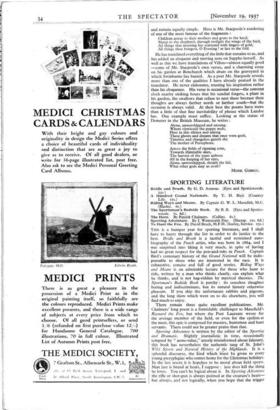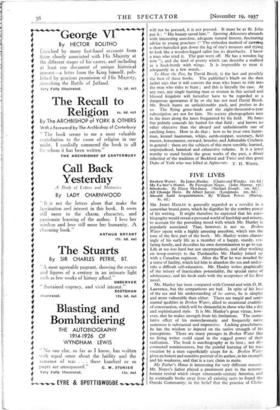SPORTING LITERATURE
The Horn. By Patrick Chalmers. (Collins. 6s.)
THIS is a bumper year for sporting literature, and I shall have to hurry through the list in order to do justice to the best. Bridle and Brush is a tactful and restrained auto- biography of the Punch artist, who was born in 1864, and I was surprised into liking it very much, in spite of having had no great respect for the pen-and-inks in Punch. Captain Bird's centenary history of the Grand National will be indis- pensable- to those who are interested in the race. It is exhaustive, concise and full of good stories. Riding Ways and Means is an admirable lecture for those who hunt to ride, written by a man who thinks clearly, can explain what he thinks, and is not hag-ridden by mystical theories.. The Sportsman's Bedside Book is patchy : its ceaseless slaughter boring and indiscriminate, but its natural history otherwise pleasant. If you skip the unfortunate rabbits and pigeons, and the long shots which went on to die elsewhere, you will find much to enjoy.
There remain three quite excellent publications. Mr. Chalmers' long poem is a formidable chillenger to Masefield's Reynard the Fox, but where the Poet Laureate wrote for the average member of the field, or even for the cyclists at the meet, this epic is composed for masters, huntsmen and hunt servants. There could not be greater praise than that.
Sporting Adventure is written by the _editor of the Sporting and Dramatic. Slightly journalistic in tone, occasionally tempted by " news-value,' utterly misinformed about falconry, this book has nevertheless the authentic tang of St. John's Wild Sports and Natural History of the Highlands. It is a splendid discourse, the End which 'Must be given to every young pteryplegiac who comes home for the Christmas. holidays. In the last resort it is hopeless to be moral about field sports. Man just is brutal at heart, I suppose : just does kill the thing he loves. You can't be logical about it. In Sporting Adventure the rifle or shot-gun is always pointed at the creature's heart— but always, and not logically, when you hope that the trigger will not be pressed, it is not pressed. It must be as St. John pui it : " His beauty saved him." Sporting Adventure abounds with interesting anecdote, adequate natural history, fascinating advice to young poachers (" The orthodox method of carrying a short-barrelled gun down the leg of one's trousers and trying to look like a wooden-legged sailor has its drawbacks. I know a man who tried it. The gun went off. He has a wooden leg now "), and the kind of poetry which can describe a mallard as a hock-bottle with wings. It is impossible to treat it adequately in a few words. -- To Hunt the Fox, by David Brock, is the last and possibly the best of these books. The publisher's blurb on the dust jacket says that it will convert the man who hunts to ride into the man who rides to hunt ; and this is literally the case. At any rate, any single hunting man or women in this united and blessed kingdom will hereafter have to be regarded as a dangerous ignoramus if he or she has not read David Brock. Mr. Brock hunts an unfashionable pack, and prefers to do so. The flying grass-lands and the eight-thousand-a-year subscription are not for him. No society photographers nest in the trees along the lanes frequented by his field. He hates but politely conceals his hatred for that field : and knows no other objective than the absurd and unfashionable one of catching foxes. How to do that ; how to be your own hunts- man, kennel huntsman, whips, earth-stopper, secretary, field master, horsemaster, steward, breeder, and Admirable Crichton in general : these are the subjects of this most sensible, learned, unprejudiced, lunatical and exhaustive volume. It is a jewel worthy to stand beside the great works of the past, a direOt inheritor of the tradition of Beckford and Twici and that great Duke of York who was killed at Agincourt. T. H. WHITE.

















































































































 Previous page
Previous page